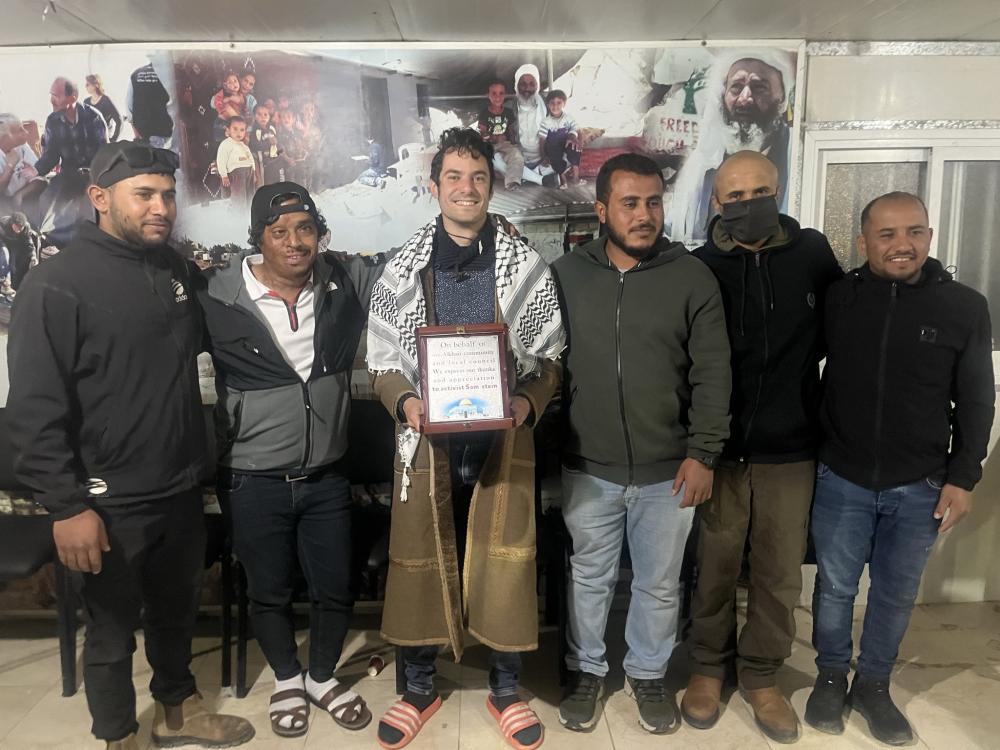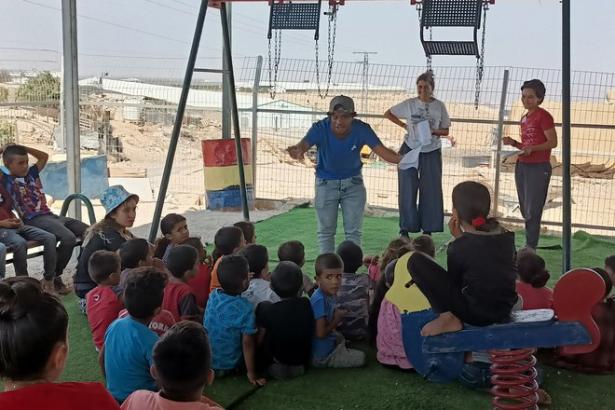Author’s note: On July 28, Palestinian activist Awdah Hathaleen was shot and killed by an Israeli settler named Yinon Levi, who is under sanctions by the United Kingdom, the European Union, France, and Canada for his attacks on Palestinians. He had also been sanctioned by the Biden Administration before the sanctions were lifted by President Donald Trump. Levi was in the West Bank village of Umm al-Kheir trespassing on private Palestinian agricultural land at the time of the shooting. He shot Awdah in the chest from more than 100 feet away. Levi was arrested by the Israeli police, but quickly released under house arrest, from which he has also been released. In the time since he was freed, the settler returned to the Palestinian land in Umm al-Kheir on which he killed Awdah.
Awdah, who co-directed the Oscar-winning documentary No Other Land, was married with three kids and spent his adult life working as an English teacher in the local elementary school. He grew up in Area C of the West Bank, which is under full Israeli control according to the Oslo Accords. Almost every home in Umm al-Kheir has a demolition order from the Israeli army and faces constant Israeli settler and military violence. The Israeli Carmel settlement has been encroaching on the village’s land ever since its establishment in 1980. Awdah, influenced by local nonviolent activists, most notably his uncle Haj Suleiman Hathaleen, engaged in nonviolent resistance. He was fond of saying, “it’s impossible to be Palestinian and not be an activist.”
My immediate thought when Awdah sat in Umm al-Kheir’s communal tent and relived his constant oppression was how impressive it was that he could so patiently and kindly share his lived experience with all these international Jews, who, upon landing in the region, had more rights than he did. Many of them, like me, were going through the process of unlearning Zionism, and there he was, bearing his soul to people who, to some extent or another, had embraced the ideology that was oppressing him. Nothing could sum him up better.
Over the next half a decade, as I kept returning to Umm al-Kheir, now leading tours with All That’s Left and Rabbis for Human Rights, my relationship with Awdah blossomed. Every time I brought a tour group to the village, I would watch as the participants played with local children and listened to Awdah speak about what it was like to live in the West Bank under Israeli occupation, about life in Umm al-Kheir—the good, the bad, and the ugly. Almost every one of them would approach me after and marvel at how eloquently he spoke. The more this happened, the more it filled me with pride—not only in my friend, but also in our friendship being so visible that people felt the need to share this with me.

Awdah Hathaleen and other residents of Umm al-Kheir give Sam Stein a keffiyeh at the end of his six months living in the village. Photo: Sam Stein.
Our relationship, and my quickly-growing bond with the community in Umm al-Kheir, eventually led me to start the Masafer Yatta Wrestling Club. Everyone else saw it as a quirky pet project, but Awdah, who dared to dream that better things are possible, saw an opportunity to provide the children of Umm al-Kheir with the outlet for recreation that they deserved. He was just as passionate as I was about providing them with a rigorous practice schedule, bringing in guest coaches from other Palestinian towns, and integrating them into the established Palestinian wrestling league. Even when the latter effort was unsuccessful, he reveled in the opportunity to provide the children with space for recreation.
In August 2024, I decided I wanted to move from Jerusalem, where I had been living for five years, and— instead of driving down once or twice a week to visit—live in Masafer Yatta full time to center activism in my daily life, improve my Arabic, and deepen my relationship with the people there. There were other Palestinian villages in the region I could have moved to, but it never crossed my mind to go anywhere other than Umm al-Kheir, where Awdah always made it clear that activists were wanted and needed for “protective presence,” a community protection strategy in which activists (usually Jewish activists, often those with Israeli citizenship) are present in Palestinian communities in the hopes that our presence will mitigate settler violence and military activity.
I made the move, and very quickly stopped feeling like “Sam, the activist” and started feeling like “Sam, the resident of Umm al-Kheir.” Whatever time wasn’t spent documenting settlers harassing residents and stealing the village’s water, I spent hanging out in the community space, smoking hookah, and drinking coffee.
Living in Umm al-Kheir wasn’t just about activism—it was about showing the world that Jews and Palestinians could live together without checkpoints and soldiers, that Israel’s claim that it maintains its oppressive apartheid regime in the name of safety was a lie. Nobody proved that better than Awdah, who was ecstatic when I told him I wanted to move to Umm al-Kheir, and who regularly told visitors—so many of them Jewish—on their second visit that they were no longer guests, but friends who were expected to join the family for dinner and spend the night.
Awdah was almost as excited as I was when his mom and one of his nephews began calling me by their family name, “Sam Hathaleen.” He started quizzing his nieces, nephews, and other children: “What’s Sam’s name?” And it stuck. I was a Hathaleen. Nobody else in the world could turn an upper class, suburban, white American Jew into “just one of the guys” in a tiny Bedouin Palestinian village under Israeli occupation in the West Bank.
When so many Palestinians are, understandably, just trying to stay alive and make it to the end of the day, Awdah thought about building a movement and creating a better future for his own children and his students. Part of our bond came from this shared ambition, though I had substantially more privilege to do so. After his murder, I cannot pretend my hope hasn’t wavered. But, in Awdah’s honor, I will cling onto the idea that a better future is possible, and that his children will grow up in that future. May the next generation not have to work as he did to imagine freedom.
Sam Stein is a Jewish-American activist based in Jerusalem. For more, follow him on Instagram and Twitter @sam_avraham.
Since 1909, The Progressive has aimed to amplify voices of dissent and those under-represented in the mainstream, with a goal of championing grassroots progressive politics. Our bedrock values are nonviolence and freedom of speech.
Based in Madison, Wisconsin, we publish on national politics, culture, and events including U.S. foreign policy; we also focus on issues of particular importance to the heartland. Two flagship projects of The Progressive include Public School Shakedown, which covers efforts to resist the privatization of public education, and The Progressive Media Project, aiming to diversify our nation’s op-ed pages. We are a 501(c)(3) nonprofit organization.


Spread the word